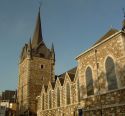The Pays de Herve in the 19th century - bicycle
A few kilometres north of the industrialized landscapes of Verviers, others have been able to keep a cachet of yesteryear. Although affected by the woolly economy, its inhabitants have preserved their agriculture and the particularities of this country of groves and grasslands. To discover and appreciate it, you have to take the time to get on your bike. The region is tamed by the fresh air and the five senses awakened.
This bicycle tour is part of three itineraries designed by the network Open Churches, The Verviers revolution at the time of the industrial revolution (FR).
Continue on PC Download PDF Continue on mobile
-
The former Herve station
The former Herve station, completely refurbished, now houses the Maison du Tourisme. The first station in Herve dates back to 1873, a relatively late date compared to the arrival of the railway in the major Belgian cities (1842)
-
The Town Hall of Herve
Under the left cornice of the Town Hall, Saint John the Baptist, the patron saint of Herve, is represented with tannery and shoemaking tools. This work testifies to the importance of these activities for the city (...)
-
Saint-Jean-Baptiste Church – Herve
Its tower dates back to the Middle Ages and looks like a dungeon, although it has always been part of a church. Dating from the early 13th century, it had a defensive function. Go inside and check the thickness of the walls: from 2.5 to 3 metres (...)
-
On the way to Soiron
This landscape of groves, so typical of the Pays de Herve, is the result of human intervention. Initially, the activity of these campaigns is the cultivation of cereals. In the 16th century, for various reasons, farmers became breeders and no longer farmers (...)
-
Saint-Roch Church – Soiron
In 1692, a great earthquake shook the whole region, the same one that would have caused the miracle of the Black Madonna at the Notre-Dame-des-Récollets church in Verviers. The village collapsed... The church tower, very solid, is one of the few buildings left standing (...)
-
The hamlet Olne
This village hides in the distance, behind the hills, at the end of the Pays de Herve. The landscape combines the gentleness of the Herven plateau with the diversity of the Ardennes mountains. The Mosane Renaissance left its mark, with the church, farms and houses in the surrounding area (...)
-
The old railway line 38
In addition to passenger transport, the railway allowed the development of coal mines, but especially local products such as Herve cheese! But with the increasing competition from the automobile, the country lines are gradually disappearing (...)



